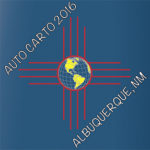 The Cartographic and Geographic Information Society is proud to present this permanent record of AutoCarto 2016, the 21st International Research Symposium on Computer-based Cartography, Albuquerque, New Mexico, USA, September 14-16, 2016.
The Cartographic and Geographic Information Society is proud to present this permanent record of AutoCarto 2016, the 21st International Research Symposium on Computer-based Cartography, Albuquerque, New Mexico, USA, September 14-16, 2016.
Scott Freundschuh, AutoCarto 2016 Conference Chair
Suggested citation (in APA format):
[Author Surname, First Initial. Second Initial]. (2016, September). [Conference paper title]. Paper presented at AutoCarto 2016, Albuquerque, New Mexico, USA. Retrieved from https://cartogis.org/autocarto-2016/.
There was no special issue of Cartography and Geographic Information Science associated with this symposium.
Map-nostics for Guiding Cartographic Exploration by Sarah Battersby and Andrea Ballatore
Unholey Maps: How to Deal with Holes in Your Data Sets by Aileen Buckley
Integrating SDI and Linked Open Data: A Case Study Using Administrative Boundaries by Silvana Philippi Camboim and Claudia Robbi Sluter
Smart Points of Interest: Big, linked and Harmonized Spatial Data by Otakar Cerba and Tomas Mildorf
Rapid 3D Modeling Using Photogrammetry Applied to Google Earth by Jorge Chen and Keith C. Clarke
Educating the Public with Maps and GIS in Museum Exhibits by Daniel Cole
Areal Differentiation Using Fuzzy Set Membership and Support Logic by Michael N. DeMers
LiDAR Models for Archaeological Feature Detection in Mayan Sites by Richard K. Ellsworth
3D Webcartographic Tools for Planetary Science Outreach by Mátyás Gede and Henrik Hargitai
Dynamic Population Mapping Using Social Media Data (Twitter) by Su Yeon Han and Ming-‐Hsiang Tsou
Interoperability in Planetary Research For Geospatial Data Analysis by Trent M. Hare
Examining 3D GIS as Enabling Technology for On-campus Situational Awareness by Paddington Hodza, Sitian Xiong, Cameron Sloan, Wendy Berelson and Jeffery Hamerlinck
Visualizing Travel Time: Approaches, Perceptual Quality and User Issues by Sungsoo Ray Hong and Sarah Battersby
Open Transport Map: Open Harmonized Dataset or Road Network by Karel Jedlička, Pavel Hájek, Jan Ježek, František Kolovský, Tomáš Mildorf, Karel Charvát, Dmitrii Kozhukh, Jan Martolos, Jan Šťastný, and Daniel Beran
Cooperative Spatial Regionalization in a Distributed Memory by Jason Laura and Sergio J. Rey
Developing a Parcel Level Natural Hazards Index: Charleston South Carolina a Case study by Norman Levine and K. Eric Anderson
Information Extraction Based on the Concept of Geographic Context by Stefan Leyk and Yao-‐Yi Chiang
MAF/TIGER® System, Horizontal Spatial Accuracy Assessments since 2000 by John Liadis
Real-‐Time Drainage Basin Modeling Using Concurrent Compute Shaders by James E. Mower
Mapping of the Vulnerability of Forest Resources due to Extreme Winter Storms in the State of Baden-‐Wurttemberg in Germany by Syed Monjur Murshed and Eric Reed
Mapping GeoRSS Feeds and the Shift from KML to GeoJSON by Michael P. Peterson
Improving TIGER, Hidden Costs: The Uncertain Correspondence of 1990 and 2010 U.S. Census Geography by Jonathan P. Schroeder
Unlisted: Variations in Location Sharing by Craigslist Users by Dara E. Seidl and Christopher Allen
An Open Source Solution to High Performance Processing for Extracting Surface Water Drainage Networks from Diverse Terrain Conditions by Lawrence V. Stanislawski, Kornelijus Survila, Jeffrey Wendel, Yan Liu, and Barbara P. Buttenfield
Enriching The National Map Database for Multi-‐ Scale Use: Introducing the VisibilityFilter Attribution by Andrew J. Stauffer, Brittany L. Roche, and Seth D. Webinger
An Automated Spatial Flow Layout Algorithm using Triangulation, Approximate Steiner Tree and Path Smoothing by Shipeng Sun
Exploring the Potential of Integrated Cadastral and Building Data for Evaluation of Remote-‐ Sensing based Multi-‐Temporal Built-‐up Land Layers by Johannes H. Uhl, Stefan Leyk, Aneta J. Florczyk, Martino Pesaresi, and Deborah Balk
Spatial Concepts for Hydrography Ontology Alignment by Dalia E. Varanka and Michelle Cheatham
Spatial, Temporal and Thematic Structure of VGI in Social Media Following Different Catastrophic Events by Haiyun Ye and Keith Clarke
Visualizing Distant Objects on Mobile Phones: Choice of Resizable Icons by Jiayan Zhao and Rui Li
Spatio-Temporal Small Area Analysis for Improved Population Estimation Based on Advanced Dasymetric Refinement by Hamidreza Zoraghein, Stefan Leyk, Barbara Buttenfield, and Matt Ruther





